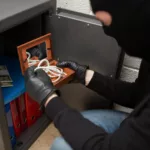This article was updated: Feb. 3rd, 2023
When they make an arrest, California police officers also often seize cash and other items of value. It can take a great deal of time and patience to recover your cash and other valuables – even if you are never convicted of a crime.
What allows the police to take someone’s money? When and why do the police seize cash? And if it’s your cash that’s taken, how can a Long Beach criminal defense law firm help you get it back?
When the police confiscate money and other items, it’s called asset forfeiture. Asset forfeiture is one of the most formidable – and often unfair – tools that law enforcement uses, and it can be used whether or not someone is actually convicted of committing a crime.
WHEN DO THE POLICE TAKE CASH AND PROPERTY?
The police seize assets – without compensating the owner – when they suspect that the money or property was used in a crime or was acquired as a result of criminal activity. California allows the police and prosecutors to seize not only money but also boats, cars, and even real estate.

Asset forfeiture laws are crafted so that it doesn’t matter if the asset owner is found guilty of committing a crime. The owner may still lose his or her property through asset forfeiture.
How unfair is asset forfeiture? In the U.S. Supreme Court’s 1996 ruling in Bennis v. Michigan, the court held that the state may seize a vehicle jointly-owned by a married couple because the husband was in the vehicle with a prostitute – even if the wife had no knowledge of the crime.
WHAT CRIMES ARE TYPICALLY LINKED TO ASSET FORFEITURE?
Asset forfeiture in California is usually connected to drug crimes or to organized crime. The American Civil Liberties Union (ACLU) has stated that asset forfeiture creates “huge incentives for law enforcement officers to police for profit.”
Police agencies are allowed to keep a large percentage of what they seize in asset forfeiture actions. In some cases, California police departments may keep sixty-five percent of the proceeds generated by asset forfeiture.
WHAT IS EQUITABLE SHARING?
“Equitable sharing” is a process that makes asset forfeiture even more unfair. Equitable sharing allows California police departments to hand over the assets they’ve seized to federal police agencies so that the assets are handled under federal asset forfeiture laws rather than state laws.
The federal asset forfeiture laws are substantially harsher than the state laws in California. Under the federal rules, local police keep eighty percent of the assets seized, and twenty percent goes to federal law enforcement agencies.

More than $300 million in assets were taken by California police departments from 2000 through 2008.
WHAT ASSETS ARE TYPICALLY SEIZED IN ASSET FORFEITURE CASES?
Under the California Uniform Controlled Substances Act, almost any type of asset or property that is involved in a drug crime in California may be targeted for asset forfeiture, including:
- controlled substances that were acquired, dispensed, distributed, or manufactured illegally
- equipment or materials used or intended for use for manufacturing, acquiring, distributing, or dispensing controlled substances
- property used to contain controlled substances or to contain the raw materials or equipment previously mentioned
- a boat, automobile, airplane, or any other vehicle that has been used for the manufacture, acquisition, dispensing, or distribution of controlled substances in certain amounts
- cash, securities, or any other item used or intended for use as payment for controlled substances or intended for use to commit other drug crimes in California
- real estate – that is, buildings or land – that has been used for the sale, manufacture, use, distribution, or storage of controlled substances, or buildings or land that has been fortified (“booby-trapped”) to keep police officers from entering
ARE THERE ANY PROPERTIES THAT MAY NOT BE SEIZED?
An exception to the law prevents California police agencies from seizing a home that is used as a family residence, and police also may not seize real estate owned by two or more individuals if one of the owners had no knowledge that the property was being used for criminal activity.
Anyone whose property or assets are seized is supposed to be issued a receipt that lists any items and the amount of cash that’s taken. A number of legal factors make it difficult for individuals in California to recover assets and properties that have been seized by the police.

If you are issued a receipt for confiscated cash or property, there will usually be instructions on the back of the receipt that explains how and when you can recover that cash or property.
WHEN SHOULD YOU SEEK A CRIMINAL DEFENSE ATTORNEY’S HELP?
If no receipt is given to you when your cash or property is confiscated, you may have to make several inquiries to the police department, and if those inquiries fail, you’ll need the help of a criminal defense lawyer.
If your cash or property is seized by the police and you are having difficulty recovering it, or if you’re charged with any crime in southern California, you must have advice and help from an experienced Long Beach criminal defense attorney, and you must contact that attorney at once.
If the police believe that a suspect has committed a drug crime, virtually anything that might be pertinent to the case may be seized.
CAN YOUR CASH OR PROPERTY BE RECOVERED AFTER ASSET FORFEITURE?
If your property or cash is seized by the police in California, you must file a claim regarding the property or cash within thirty days. The form for filing a claim (Form MC-200) is available on the website of the California court system (https://www.courts.ca.gov/).

If the cash or property has a value above $5,000, the court may require a fee to accompany your claim. If no claim is filed within thirty days, a prosecutor may declare the cash and/or property forfeited.
If a claim is filed, a hearing will be conducted to determine if the property will be forfeited or returned to the owner.
HOW CAN A DEFENSE LAW FIRM HELP YOU WITH AN ASSET FORFEITURE CLAIM?
If you have been a target of asset forfeiture, let a qualified Long Beach criminal defense attorney – someone with substantial experience in asset forfeiture matters – help you file a claim and accompany you to the forfeiture hearing.
To get your cash or property back from the police, you must act at once, and you must have the advice of an experienced defense lawyer what knows who it takes to recover what is in fact yours.
Don’t let the police take your cash or property for no good reason. If you become a target of asset forfeiture, stand up for your rights and get a criminal defense lawyer’s help at once.







